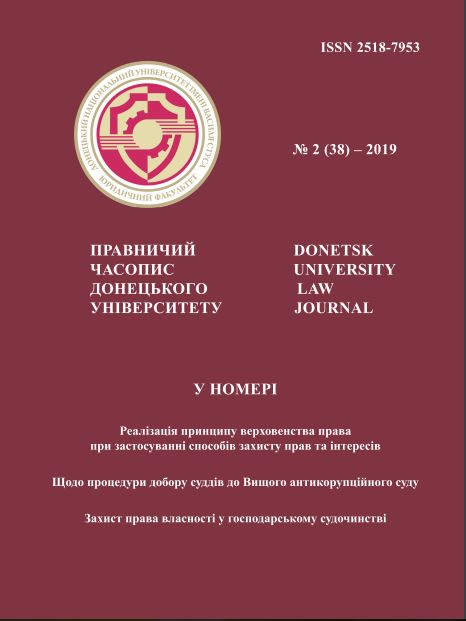Principles of legal certainty in the activity of courts and other bodies of state power.
DOI:
https://doi.org/10.31558/2518-7953.2019.2.3Keywords:
principles of law, principles of constitutionalism, basic principles of law, court, trial, principle of legal certaintyAbstract
At present, there are a lot of issues in Ukraine that are getting to grips with the pressing issues of the courts. Judgments sometimes raise complaints that may be due to a failure to comply with a number of important principles in their decision-making process. In this article, I would like to draw attention to the problem of adherence to the principles of justice, which have been repeatedly referred to in the judgments of the European Court of Human Rights. Often, this problem is that Ukraine's prolonged anti-democratic past has led to a lack of both a proper understanding of the substance and content of these principles and a lack of traditions in their application. These principles are relatively new to Ukraine, so it is difficult to overestimate the relevance of the study of their nature and content.
One such principle is the principle of legal certainty. It is extremely important for the protection of the rights of both individuals and legal entities, including in the courts. However, in the context of the analysis of the case law of the European Court of Human Rights on the principle of legal certainty, the emphasis is on protecting the rights and freedoms of individuals.
Іt should be noted that compliance with the principle of legal certainty is extremely important for the courts to protect the rights and freedoms of persons who apply to the courts. A number of judgments of the European Court of Human Rights indicate that the litigation reveals such elements of the principle as a clear statement of the reason on which a person is restricted or deprived of his liberty, the impossibility of reversing a final judgment, etc. At the same time, the emphasis on the judicial content of this principle often gives reasons to ignore the importance of its observance also by other branches of power – legislative, executive. Therefore, it is important to pay full attention to the content of the principle of legal certainty in the broad, not the narrow sense. A step forward in this direction was taken by the Constitutional Court of Ukraine in the motivating part of the decision in the case of the Verkhovna Rada of Ukraine Regulation No. 4-rp / 2008 of April 1, 2008. The prospect of further research in this area is to find the most effective ways of disseminating information on the content of the principle of legal certainty in the broadest sense.
References
Мішина Н. В. Конституційна скарга та індивідуальна заява до Європейського суду з прав людини як юридичні гарантії прав людини в Україні. Право України. 2018. № 12. С. 178–196.
Мішина Н. В. Гармонізація законодавства України з правовими позиціями Європейського Суду з прав людини (на матеріалах законодавства про громадські організації). Правничий часопис Донецького університету. 2011. № 2. С. 13–21.
Доповідь «Верховенство права», схвалена Європейською Комісією «За демократію через право» (Венеціанською Комісією) на 86-му пленарному засіданні (Венеція, 25–26 березня 2011 р.). URL: https://www.venice.coe.int/webforms/documents/default.aspx?pdffile=CDLAD(2011)003rev-ukr
Рішення Європейського суду з прав людини від 6 листопада 2008 р. у справі «Єлоєв проти України» (Заява № 17283/02). URL: https://zakon.rada.gov.ua/laws/show/ru/974_433
Рішення Європейського суду з прав людини від 18 грудня 2008 р. у справі «Новік проти України» (Заява № 48068/06). URL: https://zakon.rada.gov.ua/laws/show/ru/974_442
Погребняк С. П. Основоположні принципи права (змістовна характеристика). Харків: Право, 2008. 238 с.
Рішення Конституційного Суду України від 11 березня 2010 р. № 8-рп/2010 у справі за конституційним поданням 46 народних депутатів України щодо офіційного тлумачення термінів «найвищий судовий орган», «вищий судовий орган», «касаційне оскарження», які містяться у ст.ст. 125, 129 Конституції України. Офіційний вісник України. 2010. № 21. Ст. 882.
Рішення Конституційного Суду України від 22 вересня 2005 р. № 5-рп/2005 у справі за конституційним поданням 51 народного депутата України щодо відповідності Конституції України (конституційності) положень ст. 92, п. 6 розділу X «Перехідні положення» Земельного кодексу України (справа про постійне користування земельними ділянками). Офіційний вісник України. 2005. № 39. Ст. 2490.
Рішення Конституційного Суду України від 29 червня 2010 р. № 17-рп/2010 у справі за конституційним поданням Уповноваженого Верховної Ради України з прав людини щодо відповідності Конституції України (конституційності) абз. 8 п. 5 ч. 1 ст. 11 Закону України «Про міліцію». Офіційний вісник України. 2010. № 52. Ст. 1746.
Рішення Конституційного Суду України від 20 грудня 2017 р. № 2-р/2017 у справі за конституційним поданням 49 народних депутатів України щодо відповідності Конституції України (конституційності) п. 7 ч. 2 ст. 42 Закону України «Про вищу освіту». Офіційний вісник України. 2018. № 18. Ст. 619.
Богачова Л. Л. Принцип правової визначеності в європейському і національному праві (змістовна характеристика). Теорія і практика правознавства. 2013. Вип. 2. URL: http://nbuv.gov.ua/UJRN/tipp_2013_2_74
Рішення Конституційного Суду України від 1 квітня 2008 р. № 4-рп/2008 у справі за конституційним поданням 50 народних депутатів України щодо відповідності Конституції України (конституційності) положень ч.ч. 2, 3, 4 ст. 219 Регламенту Верховної Ради України (справа про Регламент Верховної Ради України). Офіційний вісник України. 2008. № 28. Ст. 904.

